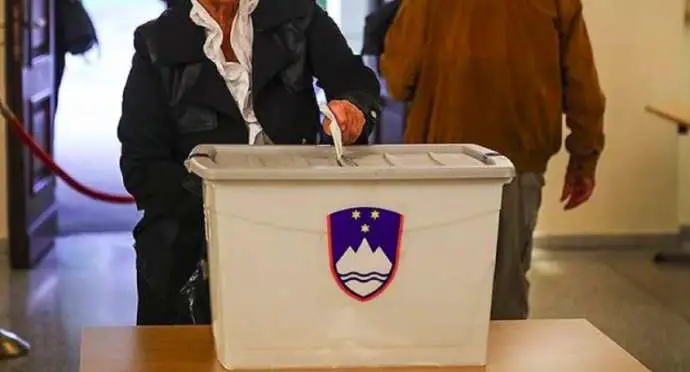STA, 1 January 2021 - Slovenia will spend much of 2022 in campaign mode as voters will head to the polls three times in what has been described as a super election year. A general election is scheduled in spring, in April at the earliest, followed by presidential and local elections in autumn.
Crowded field for general election
There has been a flurry of activity in the final months of 2021 as parties staked out their positions by adopting election manifestos. The centre field in particular is crowded as parties attempt to distance themselves from the more radical positions of the ruling Democrats (SDS) and Left on either end of the political spectrum to appeal to moderate voters.
Alliances are being built left and right, some as a counterweight to the long dominant SDS, others in order for parties to have a better shot at achieving 4% at the general election, the threshold to enter the National Assembly.
Four parliamentary centre-left opposition parties - LMŠ, SD, Left and SAB - signed a pact on post-election cooperation in September. They plan to contest the campaign individually, whereupon the best-performing party would nominate the prime minister-designate.
There have been mounting calls for the four to also forge a closer pre-election coalition, with some analysts arguing that this was the only way to defeat Prime Minister Janez Janša's SDS and potentially deflect challenges by up-and-coming alliances.
One such forthcoming alliance, called Connect Slovenia, features parties including Economy Minister Zdravko Počivalšek's Concretely and the party of former Maribor mayor Franc Kangler. They are in talks several smaller local lists to broaden their appeal.
Two green parties are also on the horizon, an attempt to capitalise on the increasing importance of green policies and finally bring green back into the mainstream, from which it has been absent for more than two decades. One was formed by Jure Leben, a former environment minister, the other was announced by two prominent green activists, Uroš Macerl and Urška Zgojznik.
Parliamentary Speaker Igor Zorčič, meanwhile, has announced he will form a liberal democratic party and has entered into talks with several prominent mayors. The party is expected to be formally established soon.
One major unknown for now is the trajectory of Robert Golob, the ousted CEO of energy trader Gen-I. Early polls show he currently enjoys significant support, but it remains unclear whether he will enter the election with a party or join an existing group. He has been coy so far, saying that he would get politically active through a broad movement.
Another party that early polls indicate might have a shot as well is Our Land, created by Aleksandra Pivec, a former agriculture minister who was swept away by an expenses scandal.
Presidential election wide open
The presidential election, to be held in autumn, will be wide open since Borut Pahor, the incumbent, is term limited and will not contest the election.
Parliamentary parties remain tight-lipped about potential candidates as they focus on the general election, and it remains unclear whether some parties will join forces or field their own candidates at least in the first round of voting.
The name most often mentioned by the media as a serious contender is Ljudmila Novak, the MEP for the Christian democratic New Slovenia (NSi), who has overtaken Pahor in popularity rankings this year. She has not made any announcements yet and it is not certain that she would even be considered by her own party given significant differences with the party's young leadership.
Local elections scheduled for 20 November
Local elections have a fixed date on the third Sunday of November but for all intents and purposes campaigning has already started as municipalities traditionally ramp up local investments in the final year before ballots are cast.
The local votes rarely reflect political realities at the national level as many candidates in Slovenia's 212 municipalities are elected from local lists without a firm party affiliation, or from smaller parties that are not represented in parliament. In the last election, the People's Party (SLS) ended with the largest number of mayors despite being absent from national politics since 2014.
One major factor affecting local ballots will be how many mayors decide to enter the general election. MPs are prohibited by law from serving as mayors and whoever is elected to parliament must give up their mayoral office.
National Council finishing its five-year term
Elections to the National Council, the upper chamber of parliament, are typically below the radar since councillors are elected indirectly by interest groups representing employers, trade unions, farmers, craftspersons, non-commercial activities and, most notably, local communities.
The National Council does not have the kind of powers that upper chambers have in true bicameral systems, but during its current term it has shown it can strongly affect politics nevertheless with its veto powers.
While it wielded the veto liberally during the term of the previous government, it was more accommodating to the current government in pre-emptively giving up veto powers when the National Assembly passed any of the ten Covid relief bills, so that the legislation could take effect immediately.
The reason its veto power has mattered more is that both the present and the previous government were minority governments in a hung parliament, making it very difficult to muster the absolute majority that is required in a re-vote.






